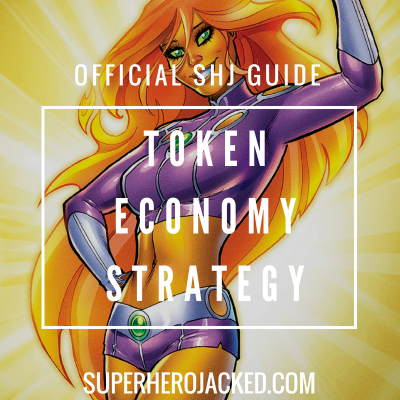Last updated on December 12th, 2019 at 09:55 pm

**These articles have been put together by Academy Member Stephen Berkemeier.
Use THIS LINK to read his 5 articles on Behavior Change. Stephen suggests the following order: 1. Guide to Behavior Change 2. Guide to Reinforcement and punishment 3. Any of the strategy articles.
You can also reach Stephen at his LinkedIn**
Disclaimer
These strategies are not meant to be a form of treatment for any type of disorder, but are rather meant to be tools available for your consideration while on your journey to becoming superhuman! If you or a loved one suffers from physical, mental, emotional, or behavioral issues do not attempt to utilize these strategies as a remedy. Instead, reach out to a licensed professional if you wish to seek help.
Token Economy
This one’s pretty fun, and works really well with groups of people. Token economies can be found just about anywhere, we even have a small one as part of the academy (do you know what it is?)! The basic break down is that an individual or individuals can earn tokens (which are the reinforcers) for performing desirable behaviors (e.g., drinking water), and can exchange those tokens for prizes known as “backup reinforcers”. Some versions even have an added mechanic where you can lose tokens for performing undesirable behaviors (e.g., having a sugary drink). It doesn’t really matter if the tokens are real physical things like poker chips or if they’re symbolic like points on a chart, all that matters is that they have a well established value.
It’s pretty easy to set up your own token economy, just follow these four steps:
-
- Create a list of acceleration and deceleration target behaviors, including the number of tokens that people can earn (or lose) for performing each (see my article “Guide to Behavior Change”). Token economies typically work with acceleration behaviors (e.g., drinking more water), but feel free to get creative if you think it will really help!
- Create a list of backup reinforcers (prizes), including how many tokens they each cost. The possible rewards should start off simple and easy to earn and range to something that’s going to require a lot more effort! Remember the golden rule of behavioral psych! If it doesn’t seem like a reward, it’s not a reward! They can be as simple as a free-pass on your roommate’s least favorite chore or as intricate as a new car (if you have that kind of money). Regardless, rewards are subjective to every person, so if you’re doing this with others, decide on a list of rewards that everyone can agree is worth chasing after.
-
- Decide on the type of tokens you’re going to use. As mentioned earlier, tokens can be anything. They can be tangible or just symbolic. You should never enter a token economy with people you can’t trust, but it never hurts to make sure that tokens are difficult to fake or duplicate (just to help with keeping everyone honest).
- Write down your specific procedures and rules for your token economy. This is another spot where you have a lot of freedom. Is there a specific time and place where tokens are awarded? What about when they can be redeemed? Who hands them out? How many tokens does each reward cost? Etc.
And that’s pretty much it!
Token economies are fun, simple, and effective.
If you keep your eyes open, you can see them just about everywhere! It’s a valuable tool to keep by your side, while journeying to become superhuman, and it’d definitely one of my personal favorite strategies!
Join The Superhero Academy and start unleashing your inner SuperHuman.

SUPERHUMAN SECRETS V.2
NOW UPDATED AND EXPANDED WITH A NEW SECTION & SEVEN BONUSES
USD$29 USD$14.95


